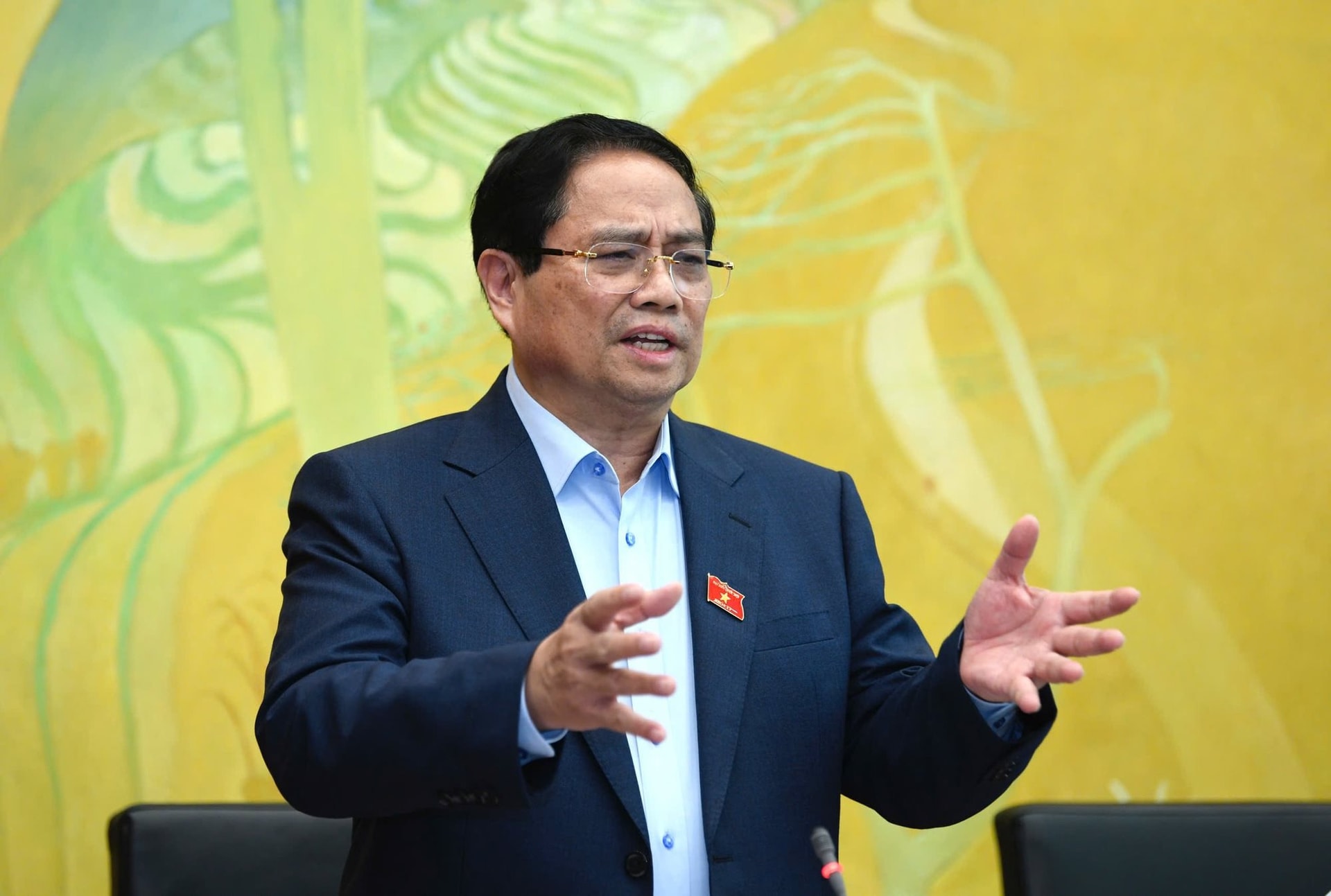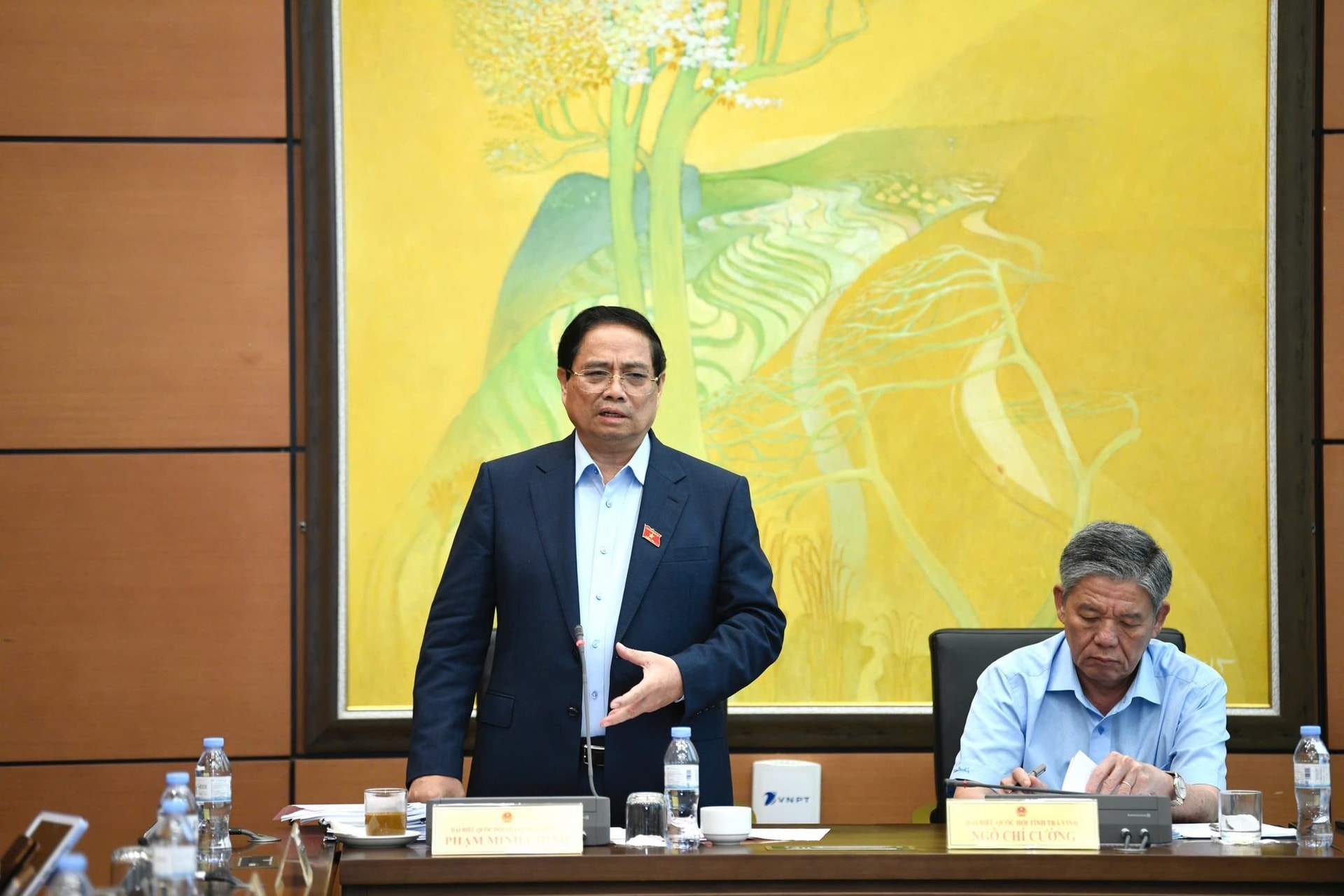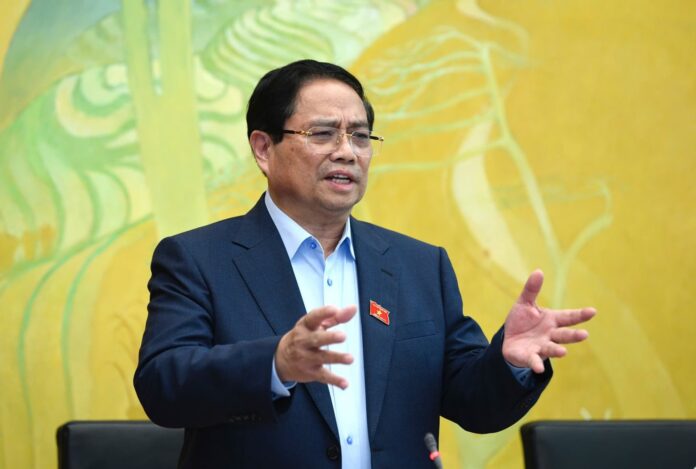
Prime Minister speaking during the discussion at the National Assembly delegation on May 23. Photo: VGP
On the morning of May 23, during a discussion with the National Assembly delegation, the Prime Minister shared tasks and solutions to achieve high economic growth targets while the world downgrades its growth forecasts, especially implementing three breakthrough strategies, deploying the quartet of pillars, promoting decentralization, and transforming the state of service for citizens and businesses. This includes maximizing streamlining procedures, shifting from pre-inspection to post-inspection, and developing planning, standards, and conditions to enable people and businesses to do what is not legally prohibited.
One of the important issues raised by the Prime Minister during the delegation discussion on socio-economic situations was the policy of practicing thrift and combating wastefulness.
According to the Prime Minister, there are many projects that have been stagnant for years and through multiple terms due to inappropriate policies. For instance, in the field of wind and solar power, previous policies were unsuitable, leading to negative consequences and a large number of projects being hastily constructed without proper planning and procedures. The Government has had to issue resolutions to address these issues, aiming to harmonize interests and share risks.
The head of the Government stated that, according to statistics from local authorities, there are currently about 2,200 stagnant projects nationwide. If these projects are unblocked, it is estimated that more than $230 billion, equivalent to about 50% of the country’s GDP, can be released. To unlock the resources tied up in these stagnant projects, the Government is continuing to develop mechanisms and policies to submit to the competent authorities for handling.
Particularly regarding wind and solar power projects, Resolution 133 had to be issued to address a series of projects. The reason for this was that the previous policies were not effective, leading to negative consequences and the hasty construction of projects without proper planning and procedures…
The Prime Minister affirmed the stance of not legalizing violations but seeking solutions to handle them. This includes addressing organizational and personnel issues, as well as institutional, legal, and implementation aspects. The Prime Minister emphasized that as the situation changes, mechanisms and policies must also change.
Accepting “tuition fees” to handle thousands of stagnant projects

According to the Prime Minister, decisively addressing stagnant projects is inevitable. Photo: VGP
The Prime Minister expressed that it is necessary to accept this situation as a “disease,” and that if it is a disease, it must be treated, and the treatment must be correct.
“Treating the disease requires either surgery, which can be painful and involve blood loss, or clinical treatment, which still incurs costs. In summary, if we want to remedy the consequences, we cannot expect to recover 100%. We must accept losses, accept the pain, and accept what needs to be cut off,” stated the Prime Minister.
According to the Prime Minister, what is important is that by enduring this pain, we will gain new lessons and experiences to avoid repeating the same mistakes in the future.
“Decisively addressing stagnant projects is inevitable. We must accept certain losses and consider them as tuition fees. Based on this, we can develop mechanisms and policies and be determined to resolve these issues comprehensively,” the Prime Minister said.
In addition, the Prime Minister mentioned that the issue of land in forest and agricultural farms is also a pressing concern. In the past, the management and establishment of agricultural and forest farms were necessary for development. However, the subsequent lax management and lack of timely, flexible, and effective policies have led to the current situation. Therefore, we must now address the consequences in terms of both legal and practical aspects, striving to optimize the solution, and if we do not accept the pain and losses, we will not be able to resolve the issue comprehensively.
Waiting to navigate a forest of procedures means missing out on opportunities
Another crucial issue highlighted by the Prime Minister was promoting decentralization and delegation of power, along with resource allocation, enhancing implementation capacity, and strengthening inspection and supervision.
The Prime Minister questioned, “What is the point of decentralization and delegation of power if resources are not allocated accordingly? If everything has to be requested, it becomes cumbersome and leads to administrative procedures, especially for matters that should be done promptly and without objection.”
From this perspective, the Prime Minister pointed out an issue that has not been fully recognized: the waste of opportunities and time. According to the head of the Government, opportunities come and go swiftly, but if we “wait to navigate a forest of procedures, the opportunities will be long gone.”
Therefore, decentralization and delegation of power should be implemented with a proactive spirit of serving the people and businesses. When unexpected events bring opportunities, they should be addressed promptly, without waiting for administrative procedures. The Prime Minister requested that the National Assembly delegate powers to the Government, and the Government will further delegate powers to ministries, sectors, and localities.
“Proposed Application of Minimum Wage Rates in Six Centrally Governed Cities”
The proposed salary adjustments for Hanoi and Ho Chi Minh City’s communal-level subdivisions are intriguing. Hanoi’s districts are expected to implement minimum wage standards based on Regions I and II, while Ho Chi Minh City’s will apply a more varied range, from Region I to Region III, reflecting the unique socioeconomic landscapes of these vibrant cities.
Central Bank: No County-Level Branches, No Need for a Bicameral Government Structure
Are there any other adjustments you would like to make to this text? I can easily make further changes to ensure it suits your needs.
The State Bank of Vietnam emphasizes the unique structure of this organization, which lacks a district-level hierarchy. This arrangement effectively prevents conflicts that may arise during the transition to a new local government model. However, to align with practical considerations, certain legislative amendments are necessary.
“Prime Minister: Exploring an Expansion of Social Housing Policies for Larger Families”
“The Prime Minister has suggested implementing policies to encourage childbirth, such as expanding social housing policies for larger families and vulnerable individuals with children. This proposal aims to address the challenges faced by those with larger families and ensure they have adequate housing support.”
“Lawmakers Back VAT Cut Till End-2026 to Spur Consumption, Sustain Growth”
“There is a resounding consensus among members of Congress who are in favor of the government’s proposal to reduce the value-added tax rate by 2% until the end of 2026. This move is seen as a practical solution to boost consumption, support businesses, and maintain economic growth momentum amidst prevailing challenges.”
Leading with Integrity: The Key to Unlocking Progress
A creative and engaging title is essential for capturing attention and providing a glimpse into the essence of the article or text that follows. I aimed to capture the core message of avoiding waste and embracing integrity in leadership while also conveying a sense of optimism and potential.
Reform and administrative improvement are key priorities for Prime Minister Pham Minh Chinh. He emphasizes a proactive approach to serving the people and businesses, streamlining procedures, and ensuring efficient resource allocation. The Prime Minister is committed to reducing red tape and asserts that there are many ways to avoid waste as long as there is no corruption or negativity.





















